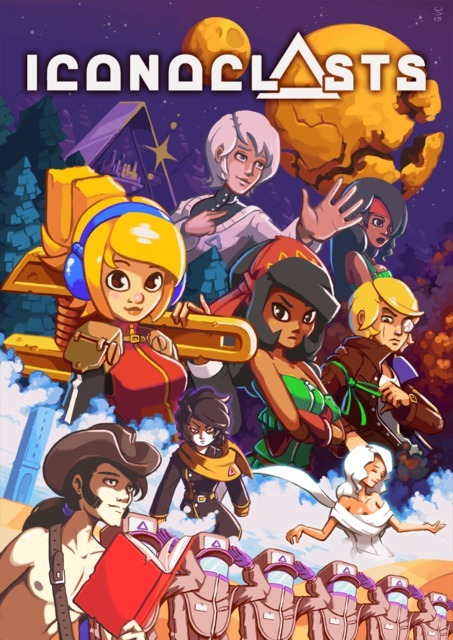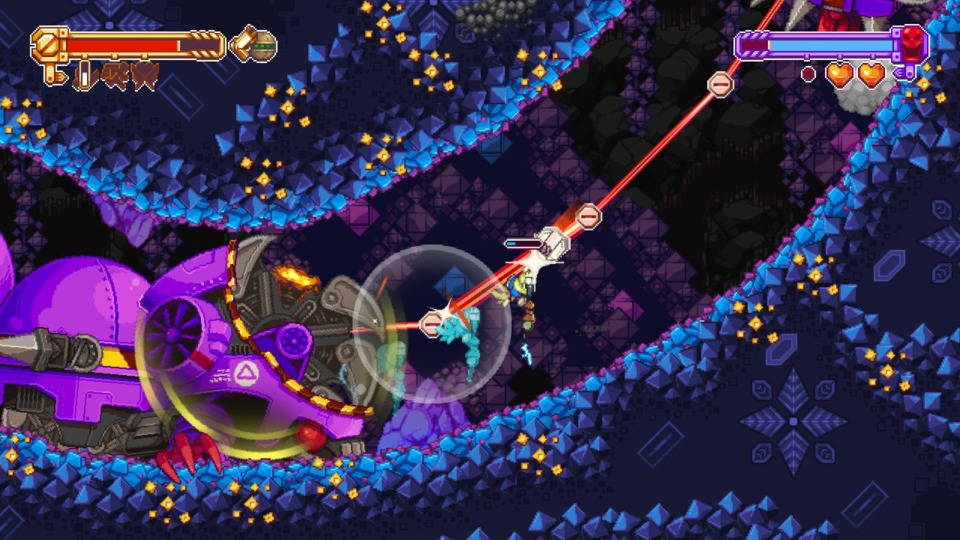Indie Game of the Week 93: Iconoclasts
By Mento 0 Comments

You know the drill (or wrench): If a new Indie spacewhipper shows up, I'm going to find a way to play it eventually. Iconoclasts - a rare case of me playing a game the year it came out - is the newest game from Noitu Love developer Joakim Sandberg and his Konjak label, and like his previous games sorts of balances a hyper-animated Metal Slug/Gunstar Heroes Saturday morning cartoonishness with a surprisingly elaborate story and world. As the recently orphaned Robin, a mechanic that works pro bono to help "sinners" in an oppressive theocracy where that is not OK, you spend a lot of time doing the requisite spacewhipper things: exploring new lands, solving environmental puzzles, fighting bosses, and noting down inaccessible power-ups, routes and treasures for later. We're closer to the "space" side than "whipper" side of the spectrum here, as one of Robin's chief weapons is her widely adaptable ranged stun-gun which can be charged up to deliver powerful blasts at the cost of a hefty cooldown period. She also wields a Ratchet giant-sized comedy wrench, which like the stun-gun is an effective weapon and a handy tool for solving puzzles. In pure mechanical terms, the game's about as archetypal for the genre as you're likely to find.
It's really the story that takes greater focus here. While Robin rarely talks except to respond to questions, the world is full of NPCs that are struggling to survive and asking for help, or surreptitiously discussing their machinations while you stay hidden from sight. To explain how this world works would take a novel to properly delineate: the world is protected by the watchful yoke of an organization called the One Concern led by a religious figure called Mother, who in turn is the only being able to communicate with "Him": a divine entity of which nothing is known beyond his occasional bouts of wrath. Buildings containing those who sin against the One Concern (or display any sort of rebellious tendencies whatsoever) are regularly reduced to rubble by Him for their transgressions: this is called Penance and has become something the terrified populace has had to become inured to. Robin's largesse, using her mechanic skills to aid the common folk instead of the One Concern alone, eventually marks her as a target to be eliminated in this fashion, and a lot of the game involves evading the near-invincible "Agents" of the One Concern and the organization's many faceless footsoldiers. Gradually, you learn more about those defying the One Concern and the nature of Him and the planet you inhabit, but it's one of those slow-burn, spoiler-filled narratives that the game frequently finds time to progress in bits and pieces. Likewise, the game's script is unconventionally robust with the importance of family and independence, critiques on dogmatic adherence, and outlining the gaslighting sinister cult-like practices of institutions like the One Concern. It doesn't shy away from scenes of violence and dismemberment either, which can feel highly incongruous when depicted with the game's Treasure-influenced colorful graphics. The complex narrative is certainly the most arresting element about the game, and its most distinctive feature when contrasted to its spacewhippin' peers, but there's a lot of worldbuilding and terminology to follow and it's tricky to know what's going on if you're not paying close attention. Personally, I'd say it was a boon: sometimes you want to press on with a spacewhipper because you want to take on the next challenge or find out what's inside a chest you were previously forced to leave behind, but here it's enough motivation just to see what happens next with the story.

Even if heavy narratives - in more than one sense of the word - aren't your thing, Iconoclasts shines brightly enough during the moments where you're figuring out how to move platforms around with electricity or bombs in order to progress, or taking on one of the game's imaginative mechanical bosses. The map UI is discernible and forthright about missing paths and items, collectibles are invariably crafting materials linked to the game's Hollow Knight-esque "tweaks" - abilities that give you a slight edge, but nothing you can't live without if you don't feel like hunting down all the chests for the necessary components - and the game is just gorgeous to watch in motion, like the creator's previous works. The bosses can be a bit much, but the game is kind enough to checkpoint you before the start of every fight and it's usually a case of finding a weakness and pouncing on it, taking advantage of parry opportunities (there's a giveaway green glow when a parry-able attack appears, though it's not always easy to get the timing right), and destroying the occasional add for HP refills. I'm finding it eminently fair so far, at any rate. There's nothing groundbreaking about the way it plays, but it does right by the genre it and so many other Indie platformers represent.
It's hard to know where to put Iconoclasts in the great pantheon of Indie spacewhippers. Sorting through the many that already exist and placing into concrete tiers might require its own scientific odyssey before too long (hmm... an idea for next year's blogging perhaps). What I will say is that Konjak made the right decision to have Iconoclasts become as narratively unusual at is, because at this juncture if you have your heart set on making a 2D spacewhipper to compete with all the others, you need some kind of angle to set yours apart. A dramatically and conceptually complicated world and story is one way to go about it, as is restructuring your old run-and-gun Treasure homages to better fit this particular brand of exploratory, ability-gated platformer while retaining its unpredictable turns and urgent action sequences. I might've wished it could be as subversive with its mechanics as something like Axiom Verge, which its name almost seems to suggest, but there's no arguing that this is a fundamentally solid "one of those" with a handful of perhaps divisive idiosyncrasies with which to distinguish itself from the herd. (Also, I've yet to complete it, so maybe everything gets really nuts towards the end. I'll be sure to edit in some kind of non-spoilerish amendment if that's the case.)
Rating: 4 out of 5.
| < Back to 92: Aarklash: Legacy | > Forward to 94: Cat Quest |
